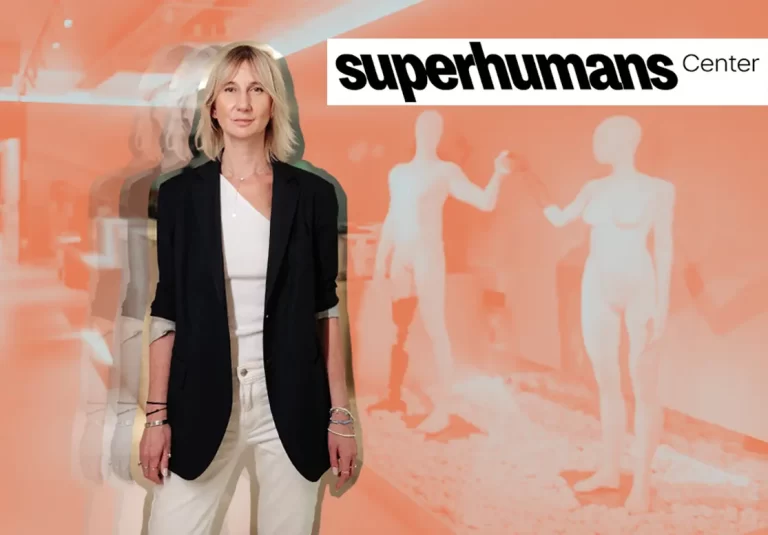
“I was lucky to work in government. I didn’t like it, but it was useful. I also had my own business. But when I joined the charitable foundation, I realised that that’s the work I wanted to do for the rest of my life — work with meaning.”
This is how Olga Rudnieva recaps the career choices that led her to spend 20 years building the culture of Ukrainian philanthropy. As Russia launched its full-scale invasion of Ukraine, Olga’s experience promoting equality and accessible medical care took her from one of the largest humanitarian aid hubs to the most innovative rehabilitation centres: Superhumans.
“If I was in Ukraine [at the time], I would probably join the paramedic forces. But I was far away and I was looking for opportunities where I could be most helpful, impact lives, and change attitudes.”

Recognizing the growing number of people with limb loss in Ukraine, Superhumans’ founder Andrey Stavnitser inspired Olga to seek innovative solutions for treatment. He needed a CEO to create a hospital offering cutting-edge prosthetics and rehabilitation. Olga couldn’t say no.
It was now her new role to convince other stakeholders, including several of the country’s most influential figures. “We approached First Lady Olena Zelenska. She listened to us very carefully, and then she asked, ‘Do you know how to do that?’ And I was about to say, ‘Of course we know! I’ve done millions of projects…’ Then Andrey said, ‘Nobody knows. But we’re going to find out.’“
This courage in the face of the unknown persuaded Zelenska to join. So did Richard Branson, Sting, Howard G. Buffet, and many more. “We started collecting a pool of people who trusted us. All we had was just an idea,” stressed Olga.
In times of war, building narratives is as important as ever. Olga shared her observations on what helped Superhumans stand out among other organisations and maintain its pace of development.
Strong partnerships constitute the core of her strategy. “We pick people by values. If they share our values, they have the same kind of blood that we have,” explained Olga. Superhumans is guided by shared values and a deep sense of camaraderie. It’s why the project also has many ambassadors — both partners and participants.
Olga drew an example: “From the very beginning, we knew that our patients, our superhumans, were going to be very media-open. We tell every person who enters Superhumans that this is part of our strategy — we want you to share your stories. Their stories are amazing, and that helps patients move forward.”



Sharing the stories, images, and rehabilitation progress helps patients maintain a positive mindset while also raising awareness about Ukraine’s situation. Olga noted that Superhumans don’t employ separate strategies for each aspect of their mission; instead, they maintain a holistic perspective.
“Solving complex issues is like assembling a puzzle with interconnected pieces. Our media materials and collaborations contribute to social reintegration, encouraging inclusive workplaces for veterans and demonstrating that remarkable transformation is possible. Depending on each patient’s unique journey, we tailor our approach to sharing their inspiring stories with our audience.”

For Olga, the importance of good data and clear goals is paramount, even though Superhumans may not seem to be a numbers game at first sight. Every action, including the creation of compelling narratives, is demand-driven. Her strategy is rooted in understanding patient needs and relevant key performance indicators (KPIs), such as a 98% adherence rate for prosthetics or meeting fundraising goals.
“Before Superhumans, we all thought that a million dollars was a lot of money. Now we know exactly how much it is — 50 lives, 50 patients that can walk out there. It’s not big money anymore. But we still need to bring this ‘very big money’ that is in fact not very big money on a monthly basis to keep functioning and providing services at the level that we want.”
Throughout their journey, Superhumans have met their own expectations as well as their timelines for doing so. Despite the immense challenges, including hospital construction during wartime, they have succeeded against all odds. But Olga underlines that their planning only expands from here on.
“If you ask me where we are right now, we are at the very initial stage of building the Superhumans universe. We have our hospital. We have our first 150 patients. We have our team and we think that this is the right people. So, we need to scale up to five more regions.”



Superhumans choose not to rely on government money, believing that Ukraine has more critical funding needs. Instead, they collaborate with the Ministries to ensure coordination and information exchange. Apart from funds, the scarcity of prosthetics specialists in Ukraine leads to a constant search for experts willing to join their multinational team.
“We have enough energy and resources to keep going. If we need more motivation, we just have to go to the centre, talk to the guys, see them taking their first steps… and we are motivated again.”
To learn more about the fascinating stories of recovery happening at Superhumans, show your support with a donation, or participate directly, visit the Superhumans website.
